- Home
- Q. Patrick
Death for Dear Clara Page 6
Death for Dear Clara Read online
Page 6
“Are you suggesting that I’m deliberately holding something back?”
“There you’ve got me, Miss Price. Offhand, I can’t see why you should. You’d have no reason to protect a Mr. Tolfrey, would you?”
“Dane Tolfrey!” The girl made no attempt to conceal the relief in her voice. “But—but he didn’t come into the office this afternoon.”
“I think you’re wrong.” Timothy bent over the desk and held out Mrs. Van Heuten’s check book. “You see these stubs? They’re the records of the checks which were presumably given you to attach to your letters. Well, there’s the stub here of another check—written later than the rest. Three hundred and fifty dollars to a Dane Tolfrey. You tell me you didn’t mail it. I’ve satisfied myself it’s nowhere in Mrs. Van Heuten’s office. There’s only one logical explanation. This afternoon Mr. Dane Tolfrey came in person to collect it.”
Madeleine Price nodded wearily. “I suppose you must be right.”
“And you never saw the ninth visitor,” explained Timothy, “because he came in through that back entrance behind the screen.”
“Yes,” put in Madeleine quickly, “that’s perfectly possible. He knew about the back entrance and used it rather than the front one.”
“Meaning most people didn’t?” Timothy was very alert.
“Mrs. Van Heuten was very particular about it. It was the first matter she brought up when I came to work here. She told me not to mention that door to anyone. She always unlocked it herself when she came in in the morning. And I locked it again at night. She said it was her only means of leaving the office when there were clients here she didn’t want to see. That’s why she had the screen put in front of it.”
So he had been right about the back door. Mrs. Van Heuten had been keeping it secret; and the reason she had given Miss Price seemed extremely inadequate. Why should the manager of so polite an institution as the Literary Advice Bureau need a means of escape from her clients? Perhaps, Timothy reflected, she was in the habit of receiving violent visitors—visitors, for example, like the nameless girl who had prophesied her murder.
Then he realized something that threw everything out of key again. Mrs. Van Heuten could always have got out through that door from inside … whether or not it was locked. She must have kept it unlocked so that someone else could always come in from outside.
“So this Mr. Tolfrey knew about the back entrance?” he asked.
“He was Mrs. Van Heuten’s oldest friend. She told me very definitely that no one else knew—no clients, no other friends.”
Timothy leaned forward, scrutinizing the girl intently. “Who is this Mr. Tolfrey?”
“Why, I really don’t know. A middle-aged, red-faced man. Whenever I’ve seen him here at the office, he’s always been drunk.”
“Drunk! The oldest friend of the respectable Mrs. Van Heuten. How incredible! But then there seem to be quite a few incredible things about Mr. Tolfrey. Doesn’t it strike you as odd that Mrs. Van Heuten, whom you described as mean about money, should have given him a check for three hundred and fifty dollars?”
Madeleine Price didn’t seem particularly interested. “I expect it was just some private debt.”
“Either that, or—” Timothy’s eyes were studiedly ingenuous. “I suppose Mr. Tolfrey couldn’t have been blackmailing Mrs. Van Heuten?”
“Blackmail?” Madeleine Price looked surprised and rather contemptuous. “Why on earth should anyone blackmail Mrs. Van Heuten? Besides, Mr. Tolfrey was her oldest friend.”
“I admire your scorn of the melodramatic, Miss Price. And once again, you’re being profitable. If, for the moment, we count out Patricia Cheney and her illustrious satellites as above suspicion, we shall have to assume that the murderer used the back entrance. You have narrowed down the suspects delightfully. Apart from yourself, only Dane Tolfrey, who must have come here this afternoon, knew about the screened door.”
“So you think,” said the girl bluntly, “that Mr. Tolfrey murdered Mrs. Van Heuten?”
“There you go again, Miss Price. No. A policeman doesn’t libel one suspect to another. Besides, one hardly stabs the goose that’s just laid three hundred and fifty golden eggs.”
“Then—then what …?” began the girl falteringly.
“Exactly. That leaves only you as a suspect, Miss Price.” Timothy’s smile was almost convincingly amused. “I suppose you didn’t murder Mrs. Van Heuten, did you?”
Madeleine Price laughed rather harshly. “Certainly not.”
“How inconsiderate of you. It would have made it all so easy. Wait a minute. There is someone else … someone else who knew about the back entrance.”
Miss Price stiffened. “Who do you mean?”
“Who else but Mrs. Van Heuten’s regular secretary—your sister. Is she addicted to murder?”
“You can’t bring Louise into this!” Madeleine Price’s loss of control was sudden and completely unexpected. She sprang to her feet, her eyes blazing. “Isn’t it bad enough for her to have a sick child; to have to pay for expensive operations and not—not have enough money, without …?” She broke off abruptly and sat down, staring blindly down at her hands.
Timothy was startled by this extraordinary outburst. Madeleine Price, apparently, was as unaccountable as everything else connected with the Literary Advice Bureau and its founder. She could face murder and cross-examination with stoic composure, only to turn into a wildcat at the mention of her sister.
“I’m sorry.” She had sunk back into her chair. “But this afternoon—it’s all been a strain.”
“Naturally.” Timothy’s voice was deceptively gentle. “No one’s accusing your sister. She’s in the country, isn’t she?”
“Yes, yes. She’s looking after Elaine, her daughter, in northern Pennsylvania.”
“What town?”
“Terrabinny. That’s our old home.”
“Terrabinny.” Timothy’s lips moved in a smile. “And how far is that from New York?”
“A long way. About two hundred and twenty miles.”
“I don’t think that’s a very long way, Miss Price. What with improvements in air travel and …”
At that moment Sergeant Danvers appeared from the inner office.
“Doc’s through with his examination, Trant.”
“Fine.” Timothy rose with a swift glance at Madeleine Price, who, very pale and breathless, had seized this opportunity to put on an austerely round black hat. “Please don’t go away yet, Miss Price. I think I’ll need you again.”
The inspector and his men were preparing for departure when Timothy entered the inner office. Two assistants from the morgue were lifting the body onto a stretcher.
“Well, Doc,” asked Timothy, “when did she die?”
“I’m no wizard, Trant, but I’d put four as the earliest and five as the latest.”
“She died from the stabbing, of course?”
“She was stabbed four times.”
Timothy whistled. “Four times—four women. And a woman’s prints on the knife.”
“What d’you mean?” Jervis was at his side, a skeptical smile on his common-sensical face. “You’re not trying to figure out the Princess Walonska and those dames did the job? They’d left the office …”
“They hadn’t.”
Swiftly Timothy outlined what Madeleine Price had told him about the four women visitors. The inspector looked seriously worried.
“My God, Trant, you don’t suppose Patricia Cheney—?” Jervis’ mind was back in the Princess’ débutante era. He was remembering a certain time when Pat Cheney, a lot of balloons and very little else, had been transferred from a speakeasy to headquarters. Several police officers had paid for that imprudent arrest with a dismissal. “That girl’s been pretty wild.”
“But even if she did feel a whimsical impulse to commit murder, why pick on Mrs. Van Heuten? And why enlist the services of those other women who certainly don’t need free publicity?”
“Don’t
ask me,” said the inspector glumly. “All I know is we’re going to have to go easy as hell with the Princess. The Cheneys have enough political pull to yank us all out of the force like so many septic teeth, if they felt like it.”
“That’s only the half of it,” said Timothy gravely. “Now that she’s adopted respectability, lost causes and a lost prince, Patricia’s got the women’s clubs in back of her solid.”
Jervis mopped his brow. “Well, she’s going to be a swell assignment for you, Trant. The force’s professional playboy better put on a fancier shirt and get to know Her Royal Highness socially.”
Timothy nodded soberly. He told the inspector the rest of his talk with Madeleine Price, stressing the importance of Dane Tolfrey’s visit.
“You’d better unearth Tolfrey right away,” he concluded. “Practically everything about him seems cockeyed. And keep an eye on that secretary, too. I don’t trust her an inch.”
A faint noise from the outer office made Timothy spin around. The noise sounded again—the whir of a telephone dial. Swiftly, he moved to the door and listened. Madeleine Price’s voice came through to him—soft, hurried.
“Is the Princess Walonska there, please?”
Timothy threw open the door. The secretary gazed at him coolly. She made no attempt to put down the receiver.
“So you’re calling the Princess, Miss Price?”
“I’m not forbidden to use the telephone, am I?”
“And just why are you calling the Princess?”
“It would hardly be a guilty reason, with the police in the next room.” Madeleine Price smiled coldly. “I just remembered Mrs. Van Heuten was giving a cocktail party this evening. I have to put off the guests.”
“You’re an extremely efficient girl, Miss Price, but the police force doesn’t really need your help.”
Gently Timothy took the receiver from her ear and placed it back on the instrument. With equal gentleness, he gave a rakish tilt to her round black hat.
“There,” he said gravely, “if you must wear a hat like that put some pep in it. Now, if you have a list of guests, I can do the putting off myself.”
Without smiling the girl straightened her hat and gave him a piece of paper which she had been holding in her hand. Timothy scanned it. Among the names of other social and literary celebrities, there figured not only that of the Princess Walonska, but also that of Dane Tolfrey. Timothy glanced at his watch.
“Ten after six, Miss Price. On second thoughts, no one’s going to do the putting off. This is far too interesting a party. It may even include Mrs. Van Heuten’s murderer.”
The secretary shrugged. “You can hardly have a party without a hostess,” she said.
“Exactly. But there will be a hostess. You and I are attending it together, Miss Price. And you are going to do the honors. You can announce that your employer has been unavoidably detained.”
The girl’s eyes flickered uneasily over the old green blouse, the creased gray skirt.
“But I can’t possibly go to a party like that—not in these clothes.”
“Nonsense, Miss Price. You don’t have to worry about clothes. With your self-confidence, you could get away with murder, let alone a post-mortem cocktail party.”
Grinning, Timothy moved back into the inner office. He crossed to the inspector.
“Listen, Jervis, I’ll be out of commission for a couple of hours. I’m going to a cocktail party.”
“A cocktail party?”
“At Mrs. Van Heuten’s. Rather macabre with a dead hostess, but Dane Tolfrey and the Princess Walonska will probably be there. I thought it would be a good opportunity to make their unofficial acquaintance.”
“Okay, Trant.” The inspector nodded. “I’ll keep the boys from going over until the party’s through.”
“And for God’s sake, keep the press out of this. We don’t want it to break that Her Cheney Highness is involved. And another thing; get a man to trail Tolfrey when he leaves the party. He doesn’t know we know he was here this afternoon. He may do something to give us a lead.”
“Okay. And when you’re sipping cocktails with the Princess Walonska, Trant,” said Jervis with ponderous humor, “you might ask her for the honor of her royal fingerprints.”
Back in the outer office, Timothy turned to the secretary.
“Do you have a mirror?”
Without comment, Madeleine Price opened her pocket-book and produced a cheap square mirror.
“Fine. Hold it up for me, please. That’s right.”
Timothy felt in his hip pocket and produced two plain colored ties—one blue, the other maroon.
“As a woman, Miss Price, which would you suggest for a literary cocktail party? The blue is rather refined, isn’t it?”
The girl stared at him frigidly. “So you are mad!”
“Come now, Miss Price. That’s a very hasty judgment—like my selection of the blue tie. Obviously, the maroon is far more appropriate. Maroon shirt and maroon tie—very intellectual.”
He whipped off the black tie and, peering into the mirror, carefully tied the maroon one.
“This is a little habit you’ll have to get used to, Miss Price. My own private substitute for the old-fashioned false beard and whiskers. Change your personality with your shirt and tie. Plain colored shirt and tie—that’s tough, for low life assignments. Plain colored shirt and black tie—respectable, safe. Plain colored shirt and the same colored tie—Mrs. Van Heuten’s promising young poetical client and cocktail guest. You see, I’m going to the party in disguise.”
He folded the two extra ties and slipped them into his pocket.
“Always carry two spares,” he explained as they moved toward the door. “In spite of derisive comments from my colleagues, I exploit every color. Excepting, of course, violet and the pastels.”
VI
A swift recombing of his hair in the taxi had completed Timothy’s temporary pose of young intellectual. When he and Madeleine Price joined the crowd of guests already assembled in Mrs. Van Heuten’s Park Avenue apartment, even the experienced eye of the butler did not detect the uninvited policeman behind the maroon shirt and tie of the artistic looking young man.
Timothy glanced around the thronged room. Social and literary celebrities jostled near-celebrities in polite vivacity, drinking Clara Van Heuten’s cocktails and talking in loud voices about themselves. Despite its absence of hostess, the party was well launched.
But there was no sign of Patricia Walonska.
Timothy turned to Madeleine. “Tolfrey here yet?”
“I don’t see him.”
“Okay. Tell me when he comes. Meanwhile, circulate your message and report any violent reactions.”
Madeleine Price moved abruptly away. Timothy watched as she approached group after group offering regrets for her employer’s non-appearance.
He was right. That girl did have something. In spite of her unambitious clothes, the defiant absence of make-up, she made most of those smarter, prettier women seem synthetic and uninteresting.
In his mind, Timothy divided people into two very definite groups—those who were fundamentally incapable of taking human life and those rare spirits in whom lurked the potential seeds of murder. Madeleine Price, he felt, belonged to the minority group. Given the right motive, she could make a cool and accomplished murderess.
Timothy started to move casually through the guests. This party had given him the opportunity he had always wanted in a murder case—a chance to see the background of a murdered person before the news of violent death had thrown it out of key.
The discreet luxury of the apartment confirmed his suspicions as to the surprising prosperity of the Literary Advice Bureau’s founder; the social and artistic prominence of the guests indicated that Clara Van Heuten had been an accepted member of the most respectably solid New York set. Timothy noticed a few rather inappropriate young men with odd haircuts and haberdashery even more violent than his own. But he had been around enough to rea
lize that stray young men are the roughage of all Manhattan cocktail parties. And their presence was more than compensated by a lavish sprinkling of the most authentically dowdy dowagers.
In passing, he heard one white-haired matron caroling: “Dear Clara’s so sympathetic. She’s been so kind and helpful about my poor little sonnets ….”
Dear Clara Van Heuten; respectable Clara who was so kind and helpful with little sonnets! Why, oh why had she ended up with a paper-knife in her back?
Timothy felt a light hand on his arm. Madeleine Price stood once more at his side. She was nodding toward the hall.
“There he is.”
Timothy followed the direction of her eyes. A florid, middle-aged man was making a rather unsteady entrance.
“That’s Mr. Tolfrey.” The secretary fixed her level gaze on Timothy. “I told everyone Mrs. Van Heuten was detained. Most of them didn’t even realize she wasn’t here. May I go now?”
Timothy smiled at this blunt request. “Yes, Miss Price, you may go. But one word of advice. Don’t pay any unnecessary visits or try to leave New York.” He paused and added softly: “And if I were you, I’d go easy on communicating with Terrabinny. See you tomorrow.”
For a second the secretary’s eyes flickered. Then, without replying, she straightened the already too straight black hat and hurried away through the chattering guests.
Timothy shifted his attention instantly to Dane Tolfrey; the only man, according to the secretary, who knew about the Advice Bureau’s back entrance; the man who had used that door earlier in the afternoon and had gone away with a check for three hundred and fifty dollars.
Mrs. Van Heuten’s “oldest friend” had found a chair in a secluded corner; he had also found three cocktails which he gulped down in rapid succession. Timothy let the crowd jostle him across the room so that he appeared, as though by chance, at Tolfrey’s elbow.
He saw at once that Miss Price had not maligned Mrs. Van Heuten’s surprise visitor. Dane Tolfrey was obviously a heavy drinker. Technically, he might have been described as drunk at the moment. But his eyes, while yellowish and bloodshot, were extraordinarily shrewd. They warned Timothy that this man was no fool.

 Death Goes to School
Death Goes to School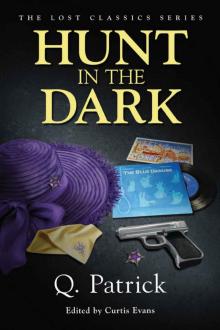 Hunt in the Dark
Hunt in the Dark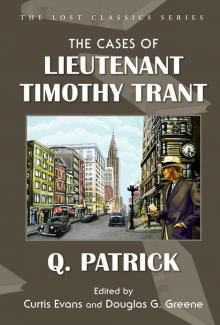 The Cases of Lieutenant Timothy Trant (Lost Classics)
The Cases of Lieutenant Timothy Trant (Lost Classics) Death for Dear Clara
Death for Dear Clara S.S. Murder
S.S. Murder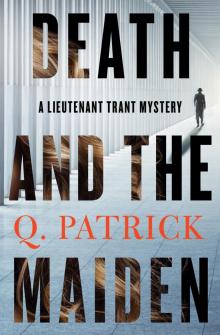 Death and the Maiden
Death and the Maiden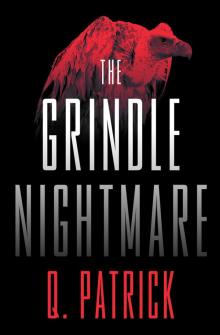 The Grindle Nightmare
The Grindle Nightmare Cottage Sinister
Cottage Sinister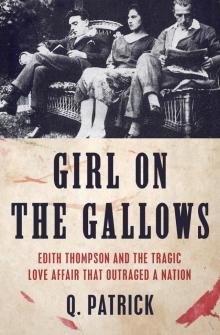 The Girl on the Gallows
The Girl on the Gallows